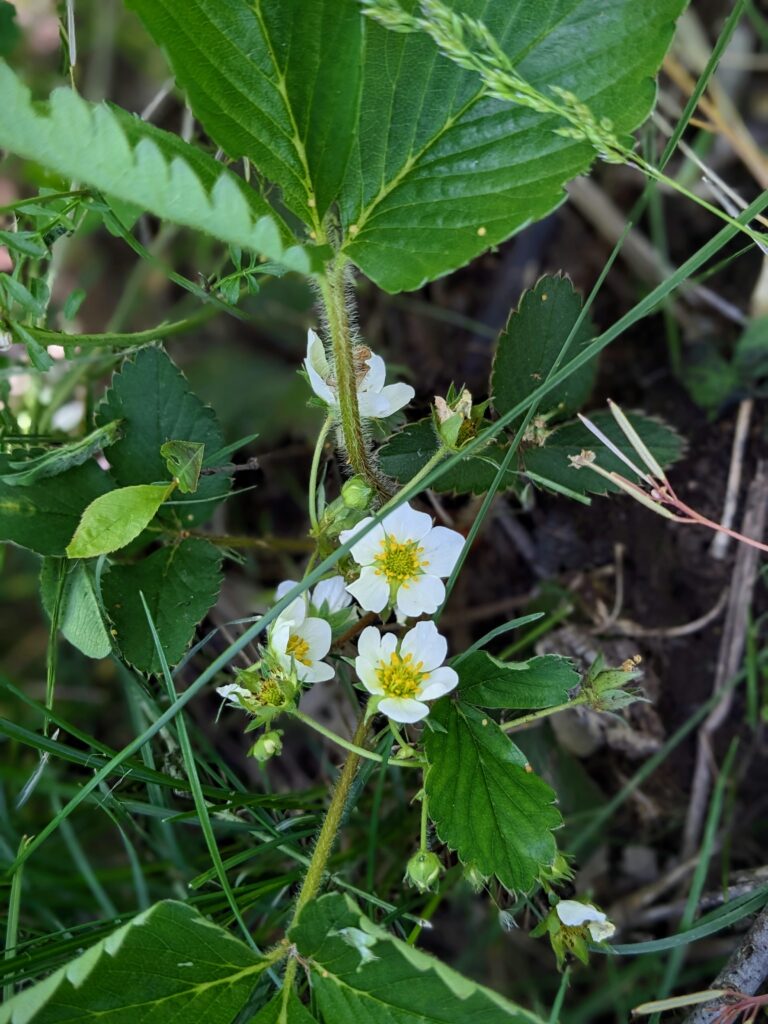
Once the temperature reaches at least 55°F consistently I’m able to take my brother for long walks—him in his wheelchair, me pushing behind. Luckily there is an accessible railway-turned-bikeway nearby. Part of the attraction for us is the (relatively) easy access to a section of undeveloped woods and forest. But there are occasional neighborhoods and developments that abut the path.
Just the other day, alongside a portion of the trail behind a newer development, I spotted wild strawberry flowers on the berm. I was immediately reminded of Thoreau’s comments in Walking about his love for seeing domesticated animals re-wild themselves.
I love even to see the domestic animals reassert their native rights—any evidence that they have not wholly lost their original wild habits and vigor; as when my neighbor’s cow breaks out of her pasture early in the spring and boldly swims the river, a cold, gray tide, twenty-five or thirty rods wide, swollen by the melted snow. It is the buffalo crossing the Mississippi. This exploit confers some dignity on the herd in my eyes—already dignified. The seeds of instinct are preserved under the thick hides of cattle and horses, like seeds in the bowels of the earth, an indefinite period.
Walking
Ideas like this are scattered throughout his works, especially the later natural history writings. For example, in Wild Apples, he compares himself to those apples who have escaped civilization and become wild fruits again.
Nevertheless, our wild apple is wild only like myself, perchance, who belong not to the aboriginal race here, but have strayed into the woods from the cultivated stock.
Wild Apples
I like to imagine that something similar occurred with these strawberries along the bike path. That they, driven by wild habits not wholly lost to them, broke free from the confines of domestic enclosure and reasserted their indigeneity.
The few wild strawberries that we have will have come and gone before the mass know it.
I do not think much of strawberries in gardens, nor in market baskets, nor in quart boxes, raised and sold by your excellent hard-fisted neighbor. It is those little natural beds or patches of them on the dry hillsides that interest me most, though I may get but a handful at first—where, however, the fruit sometimes reddens the ground and the otherwise barren soil is all beaded with them, not weeded or watered or manured by a hired gardener.
Strawberry, in Wild Fruits, ed. Bradley Dean
It will take another several weeks for these wild strawberries to bear wild fruits. Hopefully I can redden my fingers and lips with some before the chipmunks and birds get to them all, and so become a little less cultivated myself.
I perceive from time to time in the spring and have long kept a record of it, an indescribably sweet fragrance, which I cannot trace to any particular source. It is, perchance, that sweet scent of the earth of which the ancients speak. Though I have not detected the flower that emits it, this appears to be its fruit. It is natural that the first fruit which the earth bears should emit and be, as it were, a concentration and embodiment of that vernal fragrance with which the air has lately teemed. Strawberries are the manna found, ere long, where that fragrance has been. Are not the juices of each fruit distilled from the air?
Strawberry, in Wild Fruits, ed. Bradley Dean